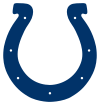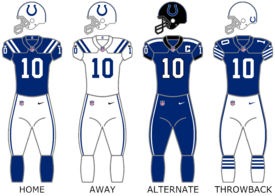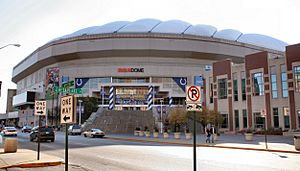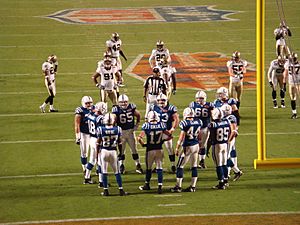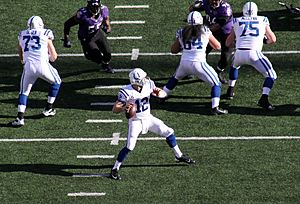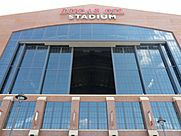Indianapolis Colts facts for kids
Quick facts for kids Indianapolis Colts |
|||||||||||||
|---|---|---|---|---|---|---|---|---|---|---|---|---|---|
|
|||||||||||||
| Basic info | |||||||||||||
| Established | January 23, 1953 | ||||||||||||
| Stadium | Lucas Oil Stadium, Indianapolis, Indiana |
||||||||||||
| Headquartered | The Indiana Farm Bureau Football Center, Indianapolis, Indiana | ||||||||||||
| Colors | Speed blue, white, facemask gray, anvil black |
||||||||||||
| Mascot | Blue | ||||||||||||
| Personnel | |||||||||||||
| Owner(s) |
|
||||||||||||
| CEO | Carlie Irsay-Gordon | ||||||||||||
| General manager | Chris Ballard | ||||||||||||
| Head coach | Shane Steichen | ||||||||||||
| Team history | |||||||||||||
|
|||||||||||||
| Home fields | |||||||||||||
|
|||||||||||||
| League / conference affiliations | |||||||||||||
National Football League (1953–present)
|
|||||||||||||
| Championships | |||||||||||||
League championships: 4†
|
|||||||||||||
Conference championships: 7
|
|||||||||||||
Division championships: 16
|
|||||||||||||
| Playoff appearances (29) | |||||||||||||
|
|||||||||||||
| Owner(s) | |||||||||||||
|
|||||||||||||
The Indianapolis Colts are a professional American football team. They are based in Indianapolis, Indiana. The Colts play in the National Football League (NFL). They are part of the American Football Conference (AFC) South division.
Since the 2008 season, the Colts have played their home games at Lucas Oil Stadium. Before that, they played at the RCA Dome for over 20 years (1984–2007). The Colts have also hosted the NFL Scouting Combine every year since 1987.
The Colts started in Baltimore, Maryland, in 1953. They joined the NFL when their owner, Carroll Rosenbloom, bought the rights to an older team. After the AFL–NFL merger in 1970, the Colts became one of three NFL teams to join the AFC.
While in Baltimore, the team reached the playoffs ten times. They won three NFL Championship games in 1958, 1959, and 1968. The Baltimore Colts played in two Super Bowl games. They lost to the New York Jets in Super Bowl III and beat the Dallas Cowboys in Super Bowl V.
The team moved to Indianapolis in 1984. Since then, they have made the playoffs sixteen times. They have won two conference championships and played in two Super Bowls. They defeated the Chicago Bears in Super Bowl XLI and lost to the New Orleans Saints in Super Bowl XLIV.
Contents
Team History
The Colts have a long and interesting history. They started in Baltimore and later moved to Indianapolis.
Early Years in Baltimore
The team began as the Baltimore Colts in 1953. They used silver and green colors at first. This team was part of the NFL after a merger with another league. However, this early team was later disbanded.
In 1953, a new group in Baltimore, led by owner Carroll Rosenbloom, got the rights to a new NFL team. This new team was also called the Baltimore Colts. The NFL officially considers this team a new "expansion team" from 1953.
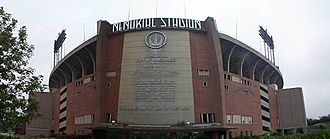
The Weeb Ewbank Era (1954–1962)
The current Colts team played its first season in Baltimore in 1953. They had a tough start, but things changed under coach Weeb Ewbank and quarterback Johnny Unitas.
Winning NFL Championships (1958–1959)
In 1958, the Colts had a 9–3 record. They reached the NFL Championship Game for the first time. The Colts beat the New York Giants 23–17 in a famous overtime game. This game is often called one of the greatest in football history.
After this first championship, the Colts won again in 1959. They defeated the Giants once more in the NFL Championship Game to claim their second title.
The Don Shula Era (1963–1969)
After their two championships, the Colts hired a new coach, Don Shula, in 1963. In 1964, the Colts had a great 12–2 record but lost the NFL Championship to the Cleveland Browns.
Another NFL Championship (1968)
In 1968, with Unitas and Shula, the Colts won their third NFL Championship. They then played in Super Bowl III. Many people thought the Colts were one of the best teams ever. They were favored to win by a lot against the New York Jets. However, the Jets, led by Joe Namath, surprised everyone and won 16–7. This was a big upset for the young AFL.
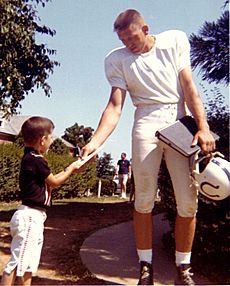
The Don McCafferty Era (1970–1972)
In 1970, the Colts joined the American Football Conference as part of the AFL–NFL merger. New coach Don McCafferty led the 1970 team to an 11–2–1 record. They won the AFC East title.
Super Bowl V Champions (1970)
The Colts won their playoff games against the Cincinnati Bengals and Oakland Raiders. They then won Super Bowl V, beating the Dallas Cowboys 16–13. This gave the Colts their fourth NFL championship and first Super Bowl win. The Colts also made the playoffs in 1971 but lost to the Miami Dolphins.
Moving to Indianapolis
On July 13, 1972, owner Carroll Rosenbloom traded the Colts to Robert Irsay. Under Irsay, the Colts struggled for a few years. In 1972, legendary quarterback Johnny Unitas was traded. The Colts did make the playoffs three times from 1975 to 1977. Their 1977 playoff loss to the Oakland Raiders was their last playoff game in Baltimore.
The team then had nine losing seasons in a row. In 1982, they finished 0–8–1 in a season shortened by a player strike. This earned them the first pick in the 1983 draft. They picked quarterback John Elway, but he refused to play for Baltimore and was traded to Denver.
The Baltimore Colts played their last home game in Baltimore on December 18, 1983. Owner Robert Irsay wanted a new stadium, but the city of Baltimore could not agree to his requests. Irsay started talking with other cities, including Indianapolis.
Indianapolis had built the Hoosier Dome (later called the RCA Dome) specifically for an NFL team. On March 29, 1984, moving vans from Indianapolis arrived at the Colts' training complex in Maryland. Workers quickly loaded all the team's belongings, and the trucks left for Indianapolis. This move happened very quickly to prevent Baltimore from stopping it.
When the Colts arrived in Indianapolis, over 143,000 people requested season tickets in just two weeks! However, the team still struggled at first. They only made the playoffs once in their first 11 seasons in Indianapolis. In 1987, they traded for Hall of Fame running back Eric Dickerson. This helped them win the AFC East and make the playoffs for the first time in Indianapolis.
The Colts continued to have tough seasons for a while. In 1991, they won only one game. Former coach Ted Marchibroda returned in 1992. In 1994, the Colts drafted running back Marshall Faulk and got quarterback Jim Harbaugh. These players helped the team improve. The Colts made the playoffs in 1995 and 1996. In 1995, they almost reached the Super Bowl, losing a close game in the AFC Championship.
The Jim Irsay Era (1997–2025)
In January 1997, Robert Irsay passed away. His son, Jim Irsay, became the principal owner. He quickly made changes, hiring Bill Polian as general manager.
The Jim Mora Years (1998–2001)
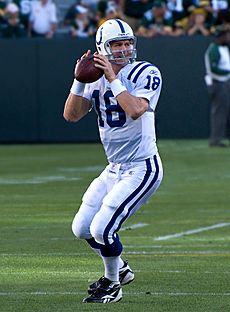
In 1998, the Colts drafted quarterback Peyton Manning with the first overall pick. Manning struggled in his first season, but the team started to improve. In 1999, they drafted Edgerrin James and had a great 13–3 record, winning the AFC East. They lost in the playoffs to the Tennessee Titans. The Colts made the playoffs again in 2000 but had a losing season in 2001.
The Tony Dungy Years (2002–2008)
After the 2001 season, Tony Dungy became the new head coach. Dungy quickly changed the team's culture. The Colts returned to the playoffs in 2002, 2003, and 2004. They often faced the New England Patriots and Tom Brady in the playoffs, starting a big rivalry.
In 2005, the Colts started with a 13–0 record. Manning and Marvin Harrison also broke an NFL record for touchdowns between a quarterback and receiver. The Colts finished 14–2 but lost in the playoffs.
Super Bowl XLI Champions (2006)
In 2006, the Colts had a strong team. They finished 12–4 and entered the playoffs. They won their first two playoff games. In the AFC Championship Game, they faced the New England Patriots again. The Colts came back from a big deficit to win 38–34. This sent them to Super Bowl XLI, their first Super Bowl appearance as the Indianapolis Colts. They defeated the Chicago Bears 29–17, winning their first Super Bowl title for Indianapolis.
After their Super Bowl win, the Colts had a 13–3 record in 2007. They lost in the playoffs, and this was their last game at the RCA Dome. In 2008, they moved to Lucas Oil Stadium. Tony Dungy retired after the 2008 season, with a great record of 92–33.
The Jim Caldwell Years (2009–2011)
Jim Caldwell became the head coach in 2009. The Colts started the 2009 season with a 14–0 record. They reached Super Bowl XLIV but lost to the New Orleans Saints 31–17.
The 2010 team finished 10–6 and lost in the playoffs. This was Peyton Manning's last game as a Colt. In 2011, Manning missed the entire season due to injury. The team struggled, finishing with a 2–14 record. This earned them the first pick in the 2012 draft. On March 8, 2012, Jim Irsay announced that Manning was released from the team.
The Chuck Pagano Years (2012–2017)
In 2012, the Colts hired Chuck Pagano as their new head coach. They also drafted quarterback Andrew Luck with the first overall pick. The team improved greatly, finishing the 2012 season with an 11–5 record. They made the playoffs, but lost to the Baltimore Ravens.
Luck led the Colts to a division championship in 2013. In the playoffs, they made a huge comeback to beat the Kansas City Chiefs. In 2014, Luck led the Colts to the AFC Championship game.
After missing the playoffs in 2015 and 2016, general manager Ryan Grigson was fired. Chris Ballard was hired to replace him in 2017. The Colts finished the 2017 season 4–12. Luck missed the entire season due to shoulder surgery. Coach Pagano was fired after the season.
The Frank Reich Years (2018–2022)
In 2018, Frank Reich became the new head coach. Andrew Luck returned to play. The Colts started 1–5 but won nine of their last ten games to make the playoffs. They won a wild card game but lost in the next round. Luck was named the 2018 Comeback Player of the Year.
In August 2019, Luck announced his retirement from the NFL. He said injuries and rehab had become too much. The Colts then signed quarterback Philip Rivers in 2020. Rivers led them to an 11–5 record and a playoff spot, but they lost in the first round.
In 2021, the Colts traded for quarterback Carson Wentz. Despite a great season from running back Jonathan Taylor, the Colts missed the playoffs. They then traded Wentz. In 2022, they traded for quarterback Matt Ryan. Ryan was later benched, and the team finished with a 4–12–1 record. Coach Reich was fired in November 2022.
The Shane Steichen Years (2023–present)
In February 2023, the Colts hired Shane Steichen as their new head coach. They drafted quarterback Anthony Richardson with the fourth pick in the 2023 NFL draft. Richardson got injured and missed most of the 2023 NFL season. Despite many injuries, the Colts finished 9–8, just missing the playoffs. In 2024, the Colts finished 8–9 and were eliminated from the playoffs.
The Carlie Irsay-Gordon Era (2025–present)
On May 21, 2025, Colts owner and CEO Jim Irsay passed away. On June 9, 2025, the team announced that his three daughters would inherit the team. Carlie Irsay-Gordon, his oldest daughter, was named the new principal owner and CEO.
Team Look and Uniforms
The Colts' helmets have been white with a blue stripe and horseshoes on the sides since 1957. Their blue jerseys have white shoulder stripes, and their white jerseys have blue stripes. They wear white pants with blue stripes.
Over the years, there have been small changes. In 1982, they wore gray pants with their blue jerseys for a few years. In 1995, they briefly wore blue pants with their white jerseys.
In 2004, the team changed their blue color to a darker "speed blue." They also brought back traditional gray face masks. In 2017, the Colts wore blue pants with their blue jerseys as part of the NFL Color Rush program.
In 2020, the team updated its wordmark logo and number fonts. They also added black as a third color, mostly for small details. In 2023, the Colts showed off a new alternate uniform. This included a black helmet, which was a first for the team. The jersey was blue with black trim and an "Indiana C" logo on the shoulder.
Team Facilities
After playing at the RCA Dome for 24 years, the Colts moved to their new home, Lucas Oil Stadium, in 2008. The city of Indianapolis and Jim Irsay agreed to build the new stadium. Lucas Oil Products bought the naming rights for 20 years.
Lucas Oil Stadium is a large, seven-level stadium. It can seat 63,000 people for football games. It has a roof that can open and close, allowing the Colts to play games outdoors. The stadium also has many modern features, like large HD video screens and luxury suites. Besides being the Colts' home, it hosts college basketball games and other events. It also hosted Super Bowl XLVI in 2012.
Team Rivalries
The Colts have several rivalries with other teams in the NFL.
Divisional Rivals
The Colts play in the AFC South division. Their main rivals are the Houston Texans, Jacksonville Jaguars, and Tennessee Titans.
Houston Texans
This is a newer rivalry. The Colts have mostly dominated this series, especially when Peyton Manning was quarterback. However, the Texans have become more competitive recently. As of the 2023 season, the Colts lead the series 33–11–1.
Jacksonville Jaguars
The Colts and Jaguars became rivals when they were placed in the AFC South. The Colts have generally had the upper hand. The Jaguars have had some big upset wins against the Colts. Both teams have become more competitive in the 2020s.
Tennessee Titans
This is the oldest rivalry in the AFC South. The Colts and Titans (who used to be the Houston Oilers) have played each other since 1970. They often compete for the AFC South title. The Colts have mostly controlled this rivalry, especially with quarterbacks Peyton Manning and Andrew Luck. Luck was undefeated against the Titans in his career. As of the 2023 season, the Colts lead the series 37–22.
Conference Rivals
New England Patriots
The rivalry between the Colts and New England Patriots became very famous in the 2000s. This was because of the quarterback battles between Peyton Manning and Tom Brady. The Patriots won many early games, including two playoff games. The Colts then won three games in a row, including the 2006 AFC Championship on their way to winning the Super Bowl.
This rivalry is interesting because the Colts and Patriots were division rivals from 1970 to 2001. But the rivalry became much bigger after the Colts moved to the AFC South. As of the 2023 season, the Patriots lead the all-time series 53–31.
Historic Rivals
New York Giants
In 1958, the Baltimore Colts played their first NFL Championship Game against the New York Giants. The Colts were not expected to win, but they won in overtime. They beat the Giants again in the 1959 championship. In recent years, the Colts and Giants have had games called the "Manning Bowl" because Peyton Manning and his brother Eli Manning were their starting quarterbacks. As of the 2023 season, the Colts lead the all-time series 12–7.
New York Jets
Super Bowl III is famous for being a huge upset. The New York Jets beat the heavily favored Baltimore Colts 16–7. After the AFL and NFL merged, the Colts and Jets were in the same division. They played twice a year until 2001. Even after the Colts moved divisions, their rivalry grew. They met three times in the playoffs between 2002 and 2010. As of the 2023 season, the Colts lead the all-time series 44–32.
Miami Dolphins
After the NFL-AFL merger, the Colts were in a new division with the Miami Dolphins. The Dolphins' coach, Don Shula, used to coach the Colts. The Colts won their division in 1970 and then won their first Super Bowl. In 1971, the Dolphins won the division and later beat the Colts in the AFC Championship.
The rivalry became less important when the Colts had many losing seasons. In 1999, there were two exciting games between the Colts (with Peyton Manning) and the Dolphins (with Dan Marino). The Dolphins won one game with a big comeback, and the Colts won the other with a last-second field goal. The rivalry mostly ended when the Colts moved to the AFC South in 2002. As of the 2023 season, the Dolphins lead the all-time series 48–28.
Famous Players
The Colts have had many amazing players throughout their history.
Retired Numbers
The Colts have retired several jersey numbers to honor their greatest players.
| No. | Player | Position | Years played | Retired |
|---|---|---|---|---|
| 18 | Peyton Manning | QB | 1998–2011 | October 8, 2017 |
| 19 | Johnny Unitas | QB | 1956–1972 | |
| 22 | Buddy Young | RB | 1953–1955 | |
| 24 | Lenny Moore | HB | 1956–1967 | November 24, 1968 |
| 70 | Art Donovan | DT | 1953–1961 | 1962 |
| 77 | Jim Parker | OL | 1957–1967 | |
| 82 | Raymond Berry | WR | 1955–1967 | |
| 89 | Gino Marchetti | DE | 1953–1966 |
Pro Football Hall of Famers
Many Colts players, coaches, and executives have been inducted into the Pro Football Hall of Fame.
| No. | Name | Positions | Seasons | Inducted |
|---|---|---|---|---|
| 82 | Raymond Berry | SE | 1955–1967 | 1973 |
| 96 | Richard Dent | DE | 1996 | 2011 |
| 29 | Eric Dickerson | RB | 1987–1991 | 1999 |
| 70 | Art Donovan | DT | 1953–1961 | 1968 |
| 28 | Marshall Faulk | RB | 1994–1998 | 2011 |
| 93 | Dwight Freeney | DE | 2002–2012 | 2024 |
| 88 | Marvin Harrison | WR | 1996–2008 | 2016 |
| 83 | Ted Hendricks | LB | 1969–1973 | 1990 |
| 32 | Edgerrin James | RB | 1999–2005 | 2020 |
| 81 | Andre Johnson | WR | 2015 | 2024 |
| 88 | John Mackey | TE | 1963–1971 | 1992 |
| 89 | Gino Marchetti | DE | 1953–1964 1966 |
1972 |
| 18 | Peyton Manning | QB | 1998–2011 | 2021 |
| 77 | Jim Parker | OT | 1957–1967 | 1973 |
| 24 | Lenny Moore | HB | 1956–1967 | 1975 |
| 34 | Joe Perry | FB | 1961–1962 | 1969 |
| 19 | Johnny Unitas | QB | 1956–1972 | 1979 |
| Name | Positions | Tenure | Inducted |
|---|---|---|---|
| Weeb Ewbank | Head coach | 1954–1962 | 1978 |
| Don Shula | Head coach | 1963–1969 | 1997 |
| Bill Polian | President/GM | 1998–2011 | 2015 |
| Tony Dungy | Head coach | 2002–2008 | 2016 |
Ring of Honor
The Ring of Honor was started on September 23, 1996. It celebrates important people in Colts history.
| No. | Name | Position | Years With Club | Inducted |
|---|---|---|---|---|
| — | Robert Irsay | Owner | 1972–1997 | 1996 |
| 80 | Bill Brooks | WR | 1986–1992 | 1998 |
| 75 | Chris Hinton | OT, OG | 1983–1989 | 2001 |
| — | Ted Marchibroda | Head Coach | 1975–1979 1992–1995 |
2002 |
| 4 | Jim Harbaugh | QB | 1994–1997 | 2005 |
| — | 12th Man | Fans | — | 2007 |
| — | Tony Dungy | Head Coach | 2002–2008 | 2010 |
| 88 | Marvin Harrison | WR | 1996–2008 | 2011 |
| 32 | Edgerrin James | RB | 1999–2005 | 2012 |
| 29 | Eric Dickerson | RB | 1987–1991 | 2013 |
| 28 | Marshall Faulk | RB | 1994–1998 | |
| 6 | Jeff Saturday | C | 1999–2011 | 2015 |
| — | Bill Polian | President/General Manager | 1998–2011 | 2017 |
| 18 | Peyton Manning | QB | 1998–2011 | |
| 87 | Reggie Wayne | WR | 2001–2014 | 2018 |
| 93 | Dwight Freeney | DE | 2002–2012 | 2019 |
| 98 | Robert Mathis | DE | 2003–2016 | 2021 |
| 78 | Tarik Glenn | OT | 1997–2006 | 2022 |
| 44 | Dallas Clark | TE | 2003–2011 | 2024 |
| — | Jim Irsay | General Manager/Owner | 1984–2025 | 2025 |
Team Records
Here are some of the all-time leaders for the Indianapolis Colts.
| Leader | Player | Record | Years with Colts |
|---|---|---|---|
| Passing | Peyton Manning | 54,828 passing yards | 1998–2011 |
| Rushing | Edgerrin James | 9,226 rushing yards | 1999–2005 |
| Receiving | Marvin Harrison | 14,580 receiving yards | 1996–2008 |
| Coaching wins | Tony Dungy | 85 wins | 2002–2008 |
| Sacks | Robert Mathis | 118 sacks | 2003–2016 |
| Interceptions | Bobby Boyd | 57 interceptions | 1960–1968 |
Images for kids
-
Hall of Fame RB Marshall Faulk
-
Hall of Fame WR Marvin Harrison
-
Hall of Fame DE Gino Marchetti
See also
 In Spanish: Indianapolis Colts para niños
In Spanish: Indianapolis Colts para niños


